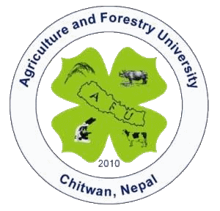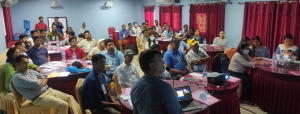Have you ever wondered what happens after a webinar ends? This story shows that a topic of great interest can inspire people on the other side of the globe to act upon knowledge gained. Here is what happened: A webinar about predatory journals held in June 2022 generated so much interest in Nepal that it was replicated as an in-person workshop in August. Then those participants were inspired to hold a post-workshop activity for university students the same month reaching a total of 84 participants. Moreover, the Agriculture and Forestry University decided to institutionalize best practices on how to avoid predatory journals.
 The workshop was particularly relevant for the nearly 100 new faculty members recently hired by the Agriculture and Forestry University (AFU). Most of these young researchers are being ‘attacked’ by predatory publishers, according to Nirajan Bhattarai, the director of AFU’s Continuing Education Center.
The workshop was particularly relevant for the nearly 100 new faculty members recently hired by the Agriculture and Forestry University (AFU). Most of these young researchers are being ‘attacked’ by predatory publishers, according to Nirajan Bhattarai, the director of AFU’s Continuing Education Center.
“These trainings on predatory academic practices have been very useful to us,” wrote Anju Adhikari, an assistant professor at the Agriculture and Forestry University in Rolpa, Nepal. “For me, it was an eye-opening training as I am a new faculty member. I suggest the team to conduct the same training to our remaining faculty members as well.”

First steps
The timely topic of predatory journals might have been missed if not for an entire webinar series organized by the Feed the Future Innovation Lab for Livestock Systems. The series, Maximizing Your Research Impact, was the brainchild of the Local Capacity Development team, co-led by Sandra Russo and Nargiza Ludgate at the University of Florida.
This team recognized a gap in awareness about the journal publication process among researchers abroad. They connected with Terry Kit Selfe, a translational research librarian at the University of Florida, who developed the materials for the webinar series.
Webinar five of six, titled “Avoiding Predatory Journals: Make your Publication Count,” was held on June 10, 2022, and attended by 123 people mainly from Burkina Faso, Niger, Ethiopia, Rwanda and Nepal. The webinar presentations are available in English and French on the Livestock Systems Innovation Lab’s website, and a recording posted on YouTube has had more than 100 views.
Next Stop, Nepal
Webinar participants from Nepal brought this content to the attention of AFU’s Continuing Education Center, and it connected with Dr. Ludgate from the Livestock Systems Innovation Lab. Within a matter of weeks, a workshop was developed and executed in collaboration with the National Young Academy of Nepal (NaYAN) in Kathmandu.
On August 4 and 5, 2022, 39 faculty members gathered at the Prince Village Resort of Chitwan in southern Nepal. One of several featured speakers named Basant Giri, a senior scientist at the Kathmandu Institute of Applied Sciences and co-chair of NaYAN, shared results of NaYAN’s survey of Nepali researchers and how this organization could support them in resisting predation.
On Day 2, small groups shared presentations about a predatory journal that they had dissected the previous day. The workshop concluded with guidelines for authorship, a question-and-answer session, and the awarding of certificates.
“The training was one of the best and effective ones. I’d recommend forming a forum at an institution level and also a network at inter-institution level for sharing and learning experience,” wrote Ramesh Silwal from Tribhuvan University.
Moving Forward
Professor Silwal and other workshop attendees from Tribhuvan University’s Institute of Forestry wasted no time in sharing what they had learned. On August 15, 2022, they gathered 45 students at the Hetauda Campus in Makwanpur for a half-day workshop on “Sensitizing the Academic Career.” It covered report writing, manuscript writing, journal publication procedures and avoiding predatory practices.
At an institutional level, AFU is developing policies to address the malpractice. They are building awareness of bad actors and plan to hold workshops for all students in their final semester.

 2
2
